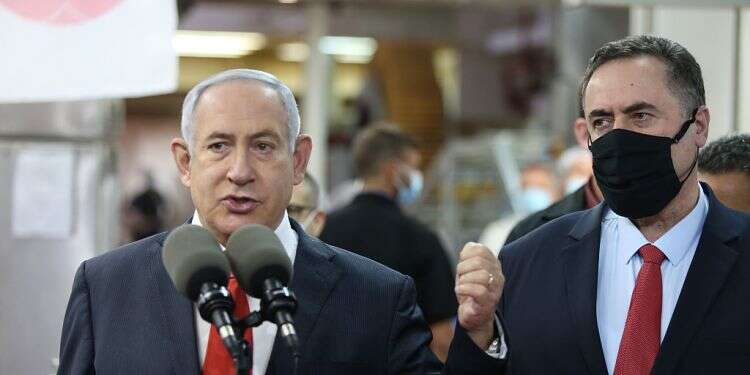Prime Minister Benjamin Netanyahu and Finance Minister Israel Katz on Sunday unveiled a new stimulus plan seeking to combat the adverse economic effects of the coronavirus pandemic.
Follow Israel Hayom on Facebook and Twitter
The government has already implemented several bailout plans since the onset of the global pandemic in March 2020, seeking to ward off recession and stabilize the economy.
The massive, nine-step plan seeks to bolster small- and medium-sized businesses, and offer grants to households and those who have lost their jobs as a result of government restrictions on the private sector in an effort to curb the outbreak,
Introducing the plan Netanyahu said, "We are unveiling today a nine-step economic stimulus plan – it's massive. I believe that the overwhelming majority of the government and Knesset will back this plan in order to stabilize businesses and the self-employed in Israel. We will take care of every citizen.
"We will bring the plan to a vote in the government, and I expect that a majority of ministers and MKs will back it. They don't want to hurt the incomes of the Israeli public."
The plan includes grants to households in the bottom-to-seventh income deciles: 750 shekels ($230) per person and NIS 500 ($152) for every child until the fourth child; and NIS 300 ($90) for every child from the fifth child.
In addition, citizens will receive cash payments, with the bottom seventy percent of income recipients eligible for the stimulus payments.
The government will give small businesses stimulus payments ranging between NIS 8,000 ($2,444) to NIS 15,000 ($4,584), depending on the damage they sustained by the coronavirus crisis, with larger businesses receiving stimulus payments of NIS 30,000 ($9,168).
New businesses opened in 2020 will receive a grant of NIS 8,000.
The government will also set aside NIS 500 million ($152 million) for one-time cash payments to the disabled.
The plan also calls for special payments intended to encourage the unemployed to return to work, affording people dismissed over the pandemic-triggered recession unemployment pay for their first month back at work, a bonus payment in their second and third months, and unemployment pay in their fourth month.
Grants will also be offered to employers who bring back workers placed on unpaid leave during lockdown.
Netanyahu and Katz said they plan to push the bailout through despite a warning from Attorney General Avichai Mendelblit not to introduce measures that could be construed as "election economics."
Israelis will head to the polls on March 23, in what is the fourth general elections the country has seen in two years.
Netanyahu dismissed the criticism, saying, "This is not election propaganda and not election economics. Why is it election economics if it helps the Israeli public?"
Blue and White accused Netanyahu of bluffing, saying the plan was an election stunt.
"Neither the government nor senior Treasury officials have seen the details of the plan yet for one reason: there are none," the party said in a statement.
"Netanyahu is scheming; he doesn't plan to make any of this actually happen. If is very sad that Netanyahu is again making promises he has no intention on keeping. He will abandon hundreds of thousands of Israelis who are waiting for help. After the election, we will ensure that a government is formed with honest people who will do everything they can to improve the economy and end the divisions in the country."
Subscribe to Israel Hayom's daily newsletter and never miss our top stories!




